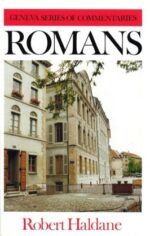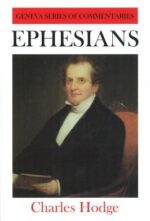Related products
-
Proverbs – Geneva Commentary Series (Charles Bridges)
$35.00By far, the most valuable and informative commentary on the book of Proverbs, dealing in great detail with each verse and drawing practical lessons from all.
“The best work on the Proverbs”, was C. H. Spurgeon’s verdict on this commentary. “While explaining the passage in hand, he (Bridges) sets other portions of the word in new lights.”
-
Romans (Robert Haldane)
$34.00‘Dr. Chalmers styled this “a well-built commentary”, and strongly recommended it to students of theology. In his “Sabbath Readings” he writes: “I am reading Haldane’s Exposition of the Epistle to the Romans, and find it solid and congenial food.”‘ — C. H. Spurgeon
Robert Haldane’s Exposition of Romans, both in its contents and in the power of its influence, stands among the foremost of the many treatments of the epistle. As a commentary, Thomas Chalmers ‘strongly recommended’ it; Spurgeon put it in the front rank, and more recently, Martyn Lloyd-Jones owed ‘much profit and pleasure’ to it, characterizing its contents as unsurpassed in ‘warmth of spirit’ and ‘practical application’.
-
Ephesians (Charles Hodge)
$22.00The great virtue of Hodge on Ephesians is his ability constantly to communicate the sense and overall argument of a passage. A peerless teacher, his aim, with the pen as in the classroom, was ‘the simple exhibition of the truth which God had revealed’- his own description of Paul’s preaching.
One of the outstanding Geneva Series commentaries.
“Hodge is most valuable. With no writer do we more fully agree.” — Charles H. Spurgeon




1 John (Robert Candlish)
$29.00
Robert Candlish’s exposition of 1 John, in the Geneva Series of Commentaries, was the ripe fruit of years of careful and delighted study of the great themes in the teaching of the Apostle John. The reader will easily notice the vivid joy Candlish takes in this epistle.
His aim was not so much to produce a detailed technical commentary after the fashion of much exegesis in the new German tradition, but to set on display the treasures of John’s letter. Says Candlish, ‘It can be studied aright exegetically, only when it is studied theologically.’ His driving purpose, like that of the apostle, is to see truth and joyful assurance born and brought to maturity in the hearts of his readers. The multi-faceted privileges of fellowship with the Father and the Son through the Spirit are constantly brought to the fore.
In stock
1 John
A Geneva Series Commentary
Robert Candlish’s exposition of 1 John, in the Geneva Series of Commentaries, was the ripe fruit of years of careful and delighted study of the great themes in the teaching of the Apostle John. The reader will easily notice the vivid joy Candlish takes in this epistle.
His aim was not so much to produce a detailed technical commentary after the fashion of much exegesis in the new German tradition, but to set on display the treasures of John’s letter. Says Candlish, ‘It can be studied aright exegetically, only when it is studied theologically.’ His driving purpose, like that of the apostle, is to see truth and joyful assurance born and brought to maturity in the hearts of his readers. The multi-faceted privileges of fellowship with the Father and the Son through the Spirit are constantly brought to the fore.
About the Author
Robert Smith Candlish (1806-1873) was born in Edinburgh, the son of a medical teacher who died when his son was just five weeks old. Having been educated at home, Candlish went on to graduate from the University of Glasgow in 1823. He followed this with studies in divinity, completing those in 1826. After two years as a tutor, he ministered as an assistant at St. Andrews in Glasgow and Bonhill, Dumbartonshire.
He was called to St. George’s, the most prominent pulpit in Edinburgh, in 1833 when only in his twenties. He was soon established as a leading figure in the group of evangelicals who would, after the Disruption in 1843, become the Free Church of Scotland. Candlish was deeply committed to the preaching ministry – he declined a chair in the newly formed denominational college, although much later (1862) he would become Principal of New College. He was Moderator of the Free Church Assembly in 1861, and received D.D. degrees from Princeton College (1841) and the University of Edinburgh (1865). His lifework well-illustrated the biblical and Reformation ideal of the pastor-theologian as both his pulpit ministry and his published works show.
Cloth over Board
Robert Candlish
608
Banner of Truth
5.25 x 7.7